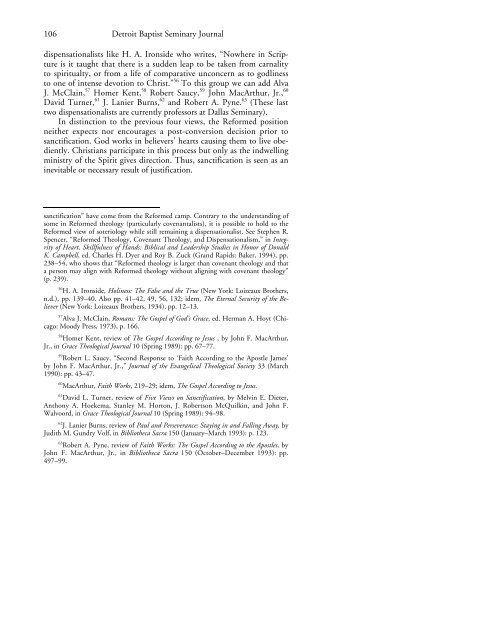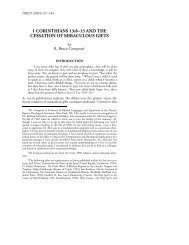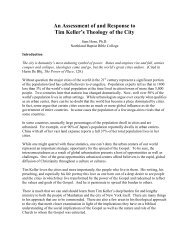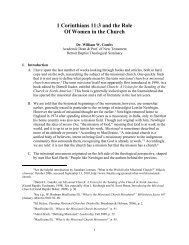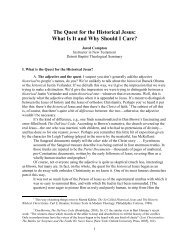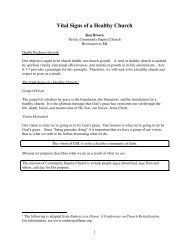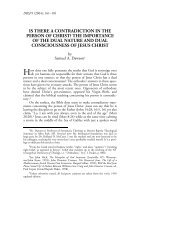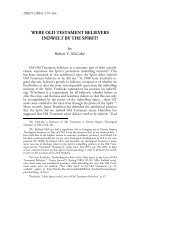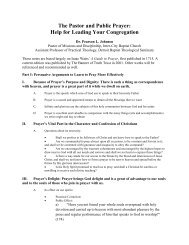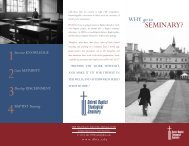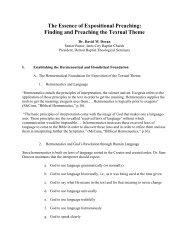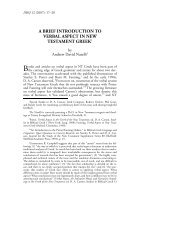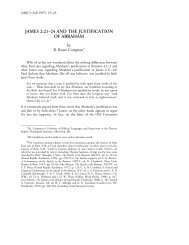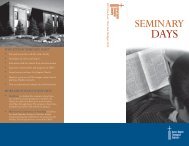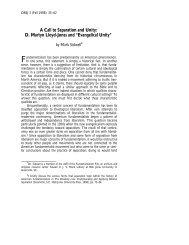Dispensational Sanctification: A Misnomer - Detroit Baptist ...
Dispensational Sanctification: A Misnomer - Detroit Baptist ...
Dispensational Sanctification: A Misnomer - Detroit Baptist ...
Create successful ePaper yourself
Turn your PDF publications into a flip-book with our unique Google optimized e-Paper software.
106 <strong>Detroit</strong> <strong>Baptist</strong> Seminary Journal<br />
dispensationalists like H. A. Ironside who writes, “Nowhere in Scripture<br />
is it taught that there is a sudden leap to be taken from carnality<br />
to spiritualty, or from a life of comparative unconcern as to godliness<br />
to one of intense devotion to Christ.” 56 To this group we can add Alva<br />
J. McClain, 57 Homer Kent, 58 Robert Saucy, 59 John MacArthur, Jr., 60<br />
David Turner, 61 J. Lanier Burns, 62 and Robert A. Pyne. 63 (These last<br />
two dispensationalists are currently professors at Dallas Seminary).<br />
In distinction to the previous four views, the Reformed position<br />
neither expects nor encourages a post-conversion decision prior to<br />
sanctification. God works in believers’ hearts causing them to live obediently.<br />
Christians participate in this process but only as the indwelling<br />
ministry of the Spirit gives direction. Thus, sanctification is seen as an<br />
inevitable or necessary result of justification.<br />
sanctification” have come from the Reformed camp. Contrary to the understanding of<br />
some in Reformed theology (particularly covenantalists), it is possible to hold to the<br />
Reformed view of soteriology while still remaining a dispensationalist. See Stephen R.<br />
Spencer, “Reformed Theology, Covenant Theology, and <strong>Dispensational</strong>ism,” in Integrity<br />
of Heart, Skillfulness of Hands: Biblical and Leadership Studies in Honor of Donald<br />
K. Campbell, ed. Charles H. Dyer and Roy B. Zuck (Grand Rapids: Baker, 1994), pp.<br />
238–54, who shows that “Reformed theology is larger than covenant theology and that<br />
a person may align with Reformed theology without aligning with covenant theology”<br />
(p. 239).<br />
56 H. A. Ironside, Holiness: The False and the True (New York: Loizeaux Brothers,<br />
n.d.), pp. 139–40. Also pp. 41–42, 49, 56, 132; idem, The Eternal Security of the Believer<br />
(New York: Loizeaux Brothers, 1934), pp. 12–13.<br />
57 Alva J. McClain, Romans: The Gospel of God’s Grace, ed. Herman A. Hoyt (Chicago:<br />
Moody Press, 1973), p. 166.<br />
58 Homer Kent, review of The Gospel According to Jesus , by John F. MacArthur,<br />
Jr., in Grace Theological Journal 10 (Spring 1989): pp. 67–77.<br />
59 Robert L. Saucy, “Second Response to ‘Faith According to the Apostle James’<br />
by John F. MacArthur, Jr.,” Journal of the Evangelical Theological Society 33 (March<br />
1990): pp. 43–47.<br />
60 MacArthur, Faith Works, 219–29; idem, The Gospel According to Jesus.<br />
61<br />
David L. Turner, review of Five Views on <strong>Sanctification</strong>, by Melvin E. Dieter,<br />
Anthony A. Hoekema, Stanley M. Horton, J. Robertson McQuilkin, and John F.<br />
Walvoord, in Grace Theological Journal 10 (Spring 1989): 94–98.<br />
62 J. Lanier Burns, review of Paul and Perseverance: Staying in and Falling Away, by<br />
Judith M. Gundry Volf, in Bibliotheca Sacra 150 (January–March 1993): p. 123.<br />
63 Robert A. Pyne, review of Faith Works: The Gospel According to the Apostles, by<br />
John F. MacArthur, Jr., in Bibliotheca Sacra 150 (October–December 1993): pp.<br />
497–99.


